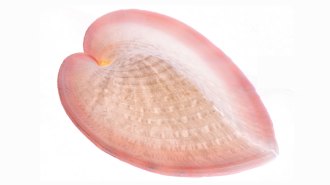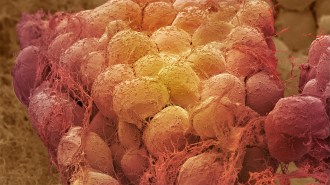All Stories
-
 Climate
ClimateClimate change has amped up hurricane wind speeds by 29 kph on average
Every single Atlantic hurricane in 2024 had wind speeds supercharged by warming seas. One even jumped two categories of intensity.
By Nikk Ogasa -
 Cosmology
CosmologyEinstein’s gravity endures despite a dark energy puzzle
The DESI project previously reported that dark energy — long thought to be constant — changes over time. A new analysis reaffirms that claim.
-
 Health & Medicine
Health & MedicineVaccines, fluoride, raw milk: How RFK Jr.’s views may shape public health
If confirmed as head of the Department of Health and Human Services, Kennedy could influence U.S. policy on vaccines, drugs and food safety.
-
 Life
LifeNature’s first fiber optics could light the way to internet innovation
Mineral crystals in heart cockles’ shells protect symbiotic algae from ultraviolet rays and could lead to innovations in internet infrastructure.
By Elie Dolgin -
 Health & Medicine
Health & MedicineYouth tobacco use has gone down, but the work isn’t over
In 2024, tobacco use among middle and high school students reached a record low, but new vapes and other products with nicotine keep coming.
-
 Health & Medicine
Health & MedicineKeeping weight off may be stymied by fat cells’ ‘memory’ of obesity
Some genetic changes in fat cells don’t go away after weight loss, a study in mice and human cells suggests.
-
 Neuroscience
NeuroscienceSome people don’t have a mind’s eye. Scientists want to know why
The senses of sight and sound are usually mingled in the brain, but not for people with aphantasia.
-

50 years on, Lucy still sparks our curiosity
Editor in chief Nancy Shute recounts the 50-year anniversary of the hominid's discovery, which upended the study of human evolution.
By Nancy Shute -

-
 Oceans
OceansThe world’s largest coral was discovered in the South Pacific
The behemoth coral, discovered in October in the Solomon Islands, is longer than a blue whale and older than the United States.
By Nikk Ogasa -
 Health & Medicine
Health & Medicine50 years ago, U.S. drinking water sparked health and safety concerns
The discovery of potential cancer-causing agents in tap water led to the Safe Drinking Water Act — a law that continues protecting public health.
By Karen Kwon -
 Planetary Science
Planetary ScienceA first look at rocks from the lunar farside create a volcanic mystery
Rocks returned by China’s Chang’e-6 mission suggest volcanic activity just 2.8 billion years ago but lack telltale heat-generating elements.